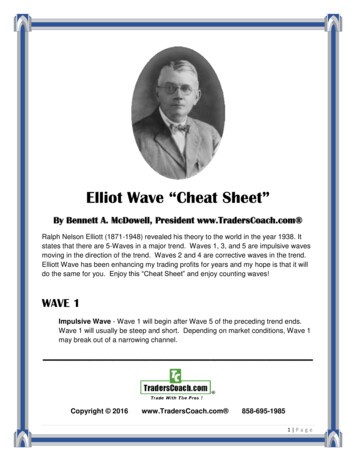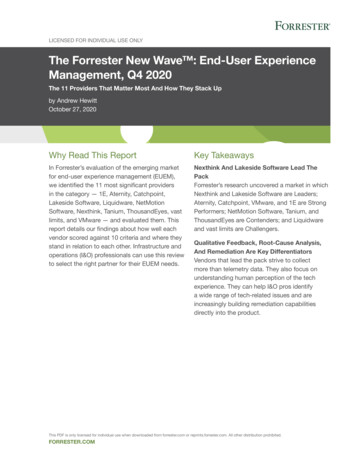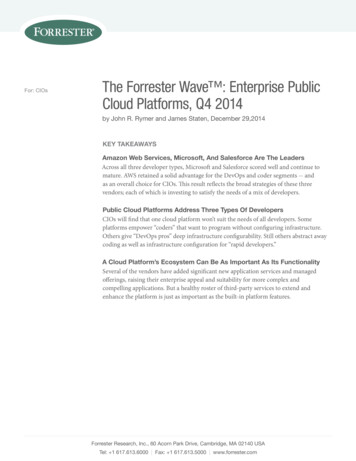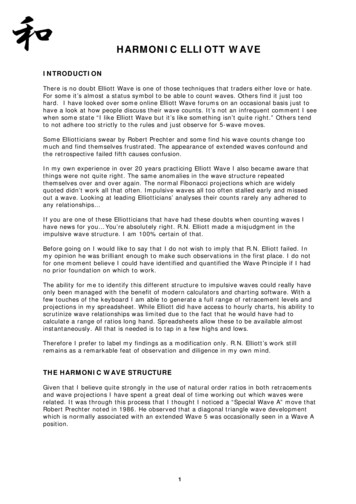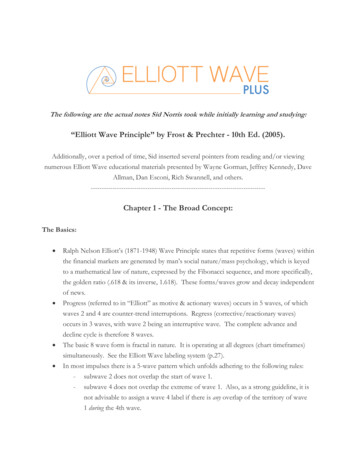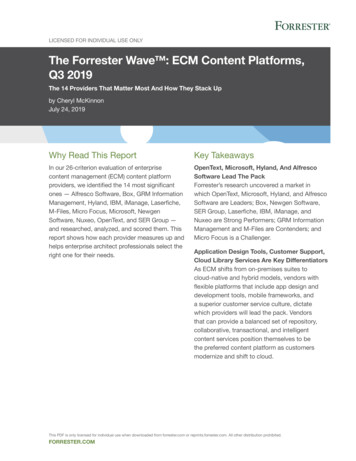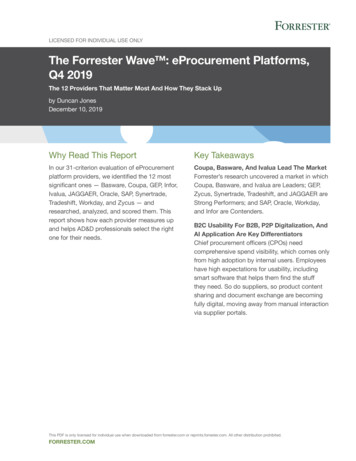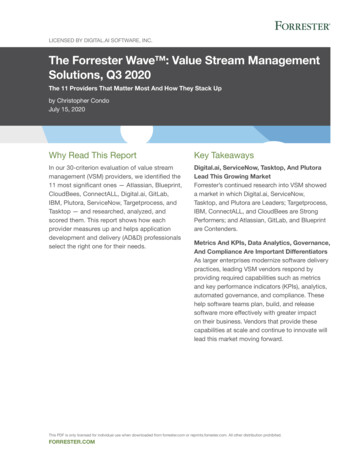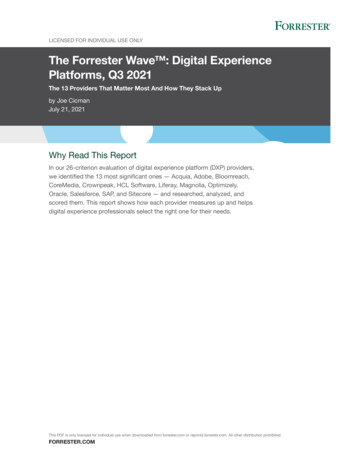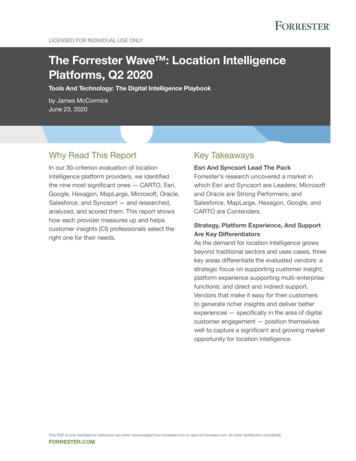
Transcription
Licensed for individual use onlyThe Forrester Wave : Location IntelligencePlatforms, Q2 2020Tools And Technology: The Digital Intelligence Playbookby James McCormickJune 23, 2020Why Read This ReportKey TakeawaysIn our 30-criterion evaluation of locationintelligence platform providers, we identifiedthe nine most significant ones — CARTO, Esri,Google, Hexagon, MapLarge, Microsoft, Oracle,Salesforce, and Syncsort — and researched,analyzed, and scored them. This report showshow each provider measures up and helpscustomer insights (CI) professionals select theright one for their needs.Esri And Syncsort Lead The PackForrester’s research uncovered a market inwhich Esri and Syncsort are Leaders; Microsoftand Oracle are Strong Performers; andSalesforce, MapLarge, Hexagon, Google, andCARTO are Contenders.Strategy, Platform Experience, And SupportAre Key DifferentiatorsAs the demand for location intelligence growsbeyond traditional sectors and uses cases, threekey areas differentiate the evaluated vendors: astrategic focus on supporting customer insight;platform experience supporting multi-enterprisefunctions; and direct and indirect support.Vendors that make it easy for their customersto generate richer insights and deliver betterexperiences — specifically in the area of digitalcustomer engagement — position themselveswell to capture a significant and growing marketopportunity for location intelligence.This PDF is only licensed for individual use when downloaded from forrester.com or reprints.forrester.com. All other distribution prohibited.forrester.com
For Customer Insights ProfessionalsThe Forrester Wave : Location Intelligence Platforms, Q2 2020Tools And Technology: The Digital Intelligence Playbookby James McCormickwith Gene Leganza and Chandler HennigJune 23, 2020Table Of Contents2 Location Intelligence Changes The GameFor Customer Insights3 Evaluation Summary6 Vendor Offerings7 Vendor ProfilesRelated Research DocumentsBeyond The Map With Location IntelligenceThe Forrester Tech Tide : Digital IntelligenceTechnologies, Q1 2019Now Tech: Location Intelligence Technologies, Q32019LeadersStrong PerformersContenders11 Evaluation OverviewShare reports with colleagues.Enhance your membership withResearch Share.Vendor Inclusion Criteria13 Supplemental MaterialForrester Research, Inc., 60 Acorn Park Drive, Cambridge, MA 02140 USA 1 617-613-6000 Fax: 1 617-613-5000 forrester.com 2020 Forrester Research, Inc. Opinions reflect judgment at the time and are subject to change. Forrester ,Technographics , Forrester Wave, TechRadar, and Total Economic Impact are trademarks of Forrester Research,Inc. All other trademarks are the property of their respective companies. Unauthorized copying or distributingis a violation of copyright law. Citations@forrester.com or 1 866-367-7378
For Customer Insights ProfessionalsJune 23, 2020The Forrester Wave : Location Intelligence Platforms, Q2 2020Tools And Technology: The Digital Intelligence PlaybookLocation Intelligence Changes The Game For Customer InsightsThe golden age of location intelligence has arrived for CI professionals. The opportunity to collectcustomer location information is exploding.1 And modern data, analytics, and business optimizationpractices are increasingly leveraging this location-based information to win, serve, and retaincustomers.2 In support, the vendor community now offers a maturing set of location intelligenceplatforms, which provide a comprehensive set of location data management, spatial analytics, andlocation execution software, as well as data products. This combination of capabilities enables CIprofessionals to synchronize and optimize customer experiences, business decisions, and actionsusing location.3 As a result of these trends, location intelligence platform customers should look forproviders with:›› A product strategy that focuses on customer insights, engagement, and experiences.Vendors in this space typically have product strategies that support the mature needs ofgeographic information system (GIS) and spatial analytics use cases. However, from theperspective of CI professionals, product vision and roadmaps differ significantly across evaluatedvendors. The variances occur in the vendors’ level of focus on helping users leverage locationintelligence to enhance customer insights, facilitate customer engagement, and optimize digitalexperiences. Using location to enhance these capabilities is critical in helping firms digitallytransform their business to compete in the age of the customer.4›› Support for different user types enabled by an enterprise platform experience. Modernenterprises need their location intelligence platform to support different functions that engagewith customers, including marketing, operations, product, and commerce. Because the level ofbusiness, technical, and data competencies vary significantly across these functions, platformsmust balance usability for business users with the data and technical sophistication needed byanalysts, technologists, and data scientists. Enterprises also need all platform components to bepackaged, tightly integrated, and easily implemented and managed across the organization.›› Supporting services and a partner ecosystem to meet enterprise needs. Most enterprises can’tgo it alone — and none should try. They need help managing location intelligence technology andapplying it to different specialized use cases. To help them succeed, vendors must make availablea range of both direct services and, via a partner ecosystem, indirect services. Examples of directservices include implementation, product, and technical support. A firm might require indirectservices for enabling specialized vertical or operational use cases. Evaluated vendors showedsignificant variance in the strength of their supporting services and their partner ecosystem. 2020 Forrester Research, Inc. Unauthorized copying or distributing is a violation of copyright law.Citations@forrester.com or 1 866-367-73782
For Customer Insights ProfessionalsJune 23, 2020The Forrester Wave : Location Intelligence Platforms, Q2 2020Tools And Technology: The Digital Intelligence PlaybookEvaluation SummaryThe Forrester Wave evaluation highlights Leaders, Strong Performers, Contenders, and Challengers.It’s an assessment of the top vendors in the market and does not represent the entire vendorlandscape. You’ll find more information about this market in the “Now Tech: Location IntelligenceTechnologies, Q3 2019” and “The Forrester Tech Tide : Digital Intelligence Technologies, Q1 2019”Forrester reports.We intend this evaluation to be a starting point only and encourage clients to view product evaluationsand adapt criteria weightings using the Excel-based vendor comparison tool (see Figure 1 and seeFigure 2). Click the link at the beginning of this report on Forrester.com to download the tool. 2020 Forrester Research, Inc. Unauthorized copying or distributing is a violation of copyright law.Citations@forrester.com or 1 866-367-73783
For Customer Insights ProfessionalsJune 23, 2020The Forrester Wave : Location Intelligence Platforms, Q2 2020Tools And Technology: The Digital Intelligence PlaybookFIGURE 1 Forrester Wave : Location Intelligence Platforms, Q2 2020Location Intelligence PlatformsQ2 eringWeaker strategyStronger strategyMarket presence**A gray bubble indicates a nonparticipating vendor. 2020 Forrester Research, Inc. Unauthorized copying or distributing is a violation of copyright law.Citations@forrester.com or 1 866-367-73784
For Customer Insights ProfessionalsJune 23, 2020The Forrester Wave : Location Intelligence Platforms, Q2 2020Tools And Technology: The Digital Intelligence yncsortglHooGForw resei tegh r’stingCARTOEsriFIGURE 2 Forrester Wave : Location Intelligence Platforms Scorecard, Q2 2020Current offering50%2.00 3.67 2.28 3.11 2.55 2.51 3.59 1.61 3.26Location intelligence datamanagement20%1.00 4.00 1.20 2.80 2.30 3.80 3.80 1.50 3.20Spatial visualization and analytics30%1.50 4.40 1.90 3.80 2.40 2.10 2.60 1.60 3.00Data products20%3.00 3.60 3.00 3.00 1.60 1.00 3.80 1.00 5.00Execution and optimization15%2.70 3.20 3.40 2.40 2.60 2.40 3.60 2.50 2.50Platform experience15%2.30 2.30 2.40 3.00 4.40 3.70 5.00 1.70 2.30Strategy50%2.30 3.60 2.10 1.30 1.90 3.60 2.40 2.90 3.90Product vision30%1.00 3.00 3.00 1.00 3.00 5.00 3.00 3.00 5.00Execution roadmap30%3.00 3.00 1.00 1.00 1.00 5.00 1.00 3.00 3.00Performance10%5.00 3.00 3.00 1.00 1.00 3.00 3.00 5.00 3.00Supporting services15%1.00 5.00 1.00 1.00 3.00 1.00 3.00 3.00 3.00Partner ecosystem15%3.00 5.00 3.00 3.00 1.00 1.00 3.00 1.00 5.00Market presence0%1.00 5.00 2.40 3.60 1.00 3.60 3.00 2.40 3.00Platform revenue35%1.00 5.00 1.00 3.00 1.00 1.00 3.00 1.00 3.00Enterprise customers35%1.00 5.00 5.00 3.00 1.00 5.00 3.00 5.00 3.00Deal size30%1.00 5.00 1.00 5.00 1.00 5.00 3.00 1.00 3.00All scores are based on a scale of 0 (weak) to 5 (strong).*Indicates a nonparticipating vendor. 2020 Forrester Research, Inc. Unauthorized copying or distributing is a violation of copyright law.Citations@forrester.com or 1 866-367-73785
For Customer Insights ProfessionalsJune 23, 2020The Forrester Wave : Location Intelligence Platforms, Q2 2020Tools And Technology: The Digital Intelligence PlaybookVendor OfferingsForrester included nine vendors in this assessment: CARTO, Esri, Google, Hexagon, MapLarge,Microsoft, Oracle, Salesforce, and Syncsort (see Figure 3).FIGURE 3 Evaluated Vendors And Product InformationVendorProduct evaluatedProduct version evaluatedCARTOCARTOframesData ObservatoryCARTO On-Premises1.02.04.0.1EsriArcGIS Platform10.8GoogleGoogle MapsCloud-based onM.App EnterpriseERDAS IMAGINEERDAS APOLLOGeoMediaGeoMedia WebMapMobile AlertHxGN Content apLargeMapLarge Mapping Engine4.XMicrosoftAzure MapsMicrosoft Azure IoTAzure AIMicrosoft Power BIAzure Synapse AnalyticsCosmosDBOracleOracle Analytics Cloud (OAC)Oracle Analytics Server (OAS)Oracle Database5.55.519c 2020 Forrester Research, Inc. Unauthorized copying or distributing is a violation of copyright law.Citations@forrester.com or 1 866-367-73786
For Customer Insights ProfessionalsJune 23, 2020The Forrester Wave : Location Intelligence Platforms, Q2 2020Tools And Technology: The Digital Intelligence PlaybookFIGURE 3 Evaluated Vendors And Product Information (Cont.)VendorProduct evaluatedProduct version evaluatedSalesforceSalesforce MapsSpring 2020SyncsortGeoAPIsGeoTAXMapInfo Pro and AdvancedMaster Location DataPerform360Spatial Insight (GeoInsight)Spectrum Enterprise Geocoding ModuleSpectrum Enterprise RoutingSpectrum for Big DataSpectrum SpatialWinsiteSpectrum Technology PlatformSyncsort data productsVendor ProfilesOur analysis uncovered the following strengths and weaknesses of individual vendors.Leaders›› Esri offers a complete platform to meet most enterprise needs. ArcGIS is the centerpieceof Esri’s location intelligence platform offering. It consists of numerous modules, including afull-featured mapping, analytics, and data management system; a hosted, online, cloud-basedmapping, analysis, and data storage system; desktop GIS products; a suite of location-enabledapplications; and APIs, software development kits (SDKs), and other developer tools. For years,Esri has been the dominant player in the market, enabled by its vision of location intelligence,which focuses on delivering business insights to customers by helping them visualize and analyzelocation in the context of enterprise data.The key strength of Esri’s platform is its complete set of location intelligence capabilities. Ithas depth and strength in multiple areas, including data management, data products, spatialvisualization and analytics, and location intelligence execution. The vendor’s success in the modernlocation intelligence market, however, is held back by a vision influenced by the traditional GISmarket. Also, its multitude of different products and modules do not come together as well assome of its competitors’ products. Reference customers love the Esri brand and its sense of socialresponsibility but express some frustration at the frequency of product licensing changes. ArcGISis ideal for enterprises with a range of data, analytical, technical, and business users looking for anall-in-one location intelligence platform. 2020 Forrester Research, Inc. Unauthorized copying or distributing is a violation of copyright law.Citations@forrester.com or 1 866-367-73787
For Customer Insights ProfessionalsJune 23, 2020The Forrester Wave : Location Intelligence Platforms, Q2 2020Tools And Technology: The Digital Intelligence Playbook›› Syncsort’s extensive capabilities target commercial firms but need tighter integration.Syncsort rebranded as Precisely on May 14, 2020.5 Its location intelligence capabilities are fromits recent acquisition of Pitney Bowes’ software and data business. These extensive capabilitiesare spread over a plethora of products, including a desktop GIS, multiple geocoding products, ageodata enrichment application, a bank branch performance management application, a locationcentric BI platform, and an enterprise routing and spatial analysis platform. Syncsort purchasedPitney Bowes’ software and data business to enhance its existing data enrichment portfolio ofproducts and services. The vendor’s vision for the location intelligence platform is to operationalizegeospatial technology and data to support the most demanding enterprise applications whilemaintaining service levels.The vendor’s record for innovation in areas such as data products and geodata enrichment are akey strength. Syncsort also provides good capabilities across most major categories assessed.However, much of the functionality is spread across product lines that lack the level of integrationseen with other evaluated vendors. Reference customers like the performance and value of theaddress cleaning and geocoding functions. Some would like Syncsort to speed up its rolloutof pbKey, now rebranded as PreciselyID, which is core to the vendor’s geocoding and geodataenrichment strategy. The vendor’s platform is ideal for commercial enterprises servicing a range oflocation intelligence use cases for business, operational, and technical functions.Strong Performers›› Microsoft has a modern vision, with capabilities dispersed across different products. AzureMaps is just one of the many products within Microsoft’s internet of things (IoT) portfolio, whichitself is part of the broader Microsoft Azure cloud computing services. The Maps REST APIs andSDKs provide geospatial capabilities for developers, including map rendering, search, routing,traffic, mobility, time zones, geolocation, geofencing, data storage, weather data, and spatialoperations. To supplement these core location intelligence capabilities, enterprises will requireother Microsoft Azure products, such as those for data warehousing, business intelligence (BI), andmanaged databased services.Microsoft’s product vision is a key strength. It aims to scale the impact of location intelligencewith AI and IoT tech to drive decisions, actions, and experiences in a digitally transformed world.The platform also provides good location data management and location intelligence executioncapabilities. The distribution of many of the enterprise capabilities across different products,however, will disappoint buyers looking for a tightly packaged offering. Reference customers likethe vendor’s postsales support and are keen for Microsoft to keep developing APIs that can helpthem not only analyze and visualize location data but also drive decisions and actions at scale. Thesolution is ideal for enterprises deep into their digital transformation journey, which have a maturelocation intelligence strategy and good coordination between technical and business teams. 2020 Forrester Research, Inc. Unauthorized copying or distributing is a violation of copyright law.Citations@forrester.com or 1 866-367-73788
For Customer Insights ProfessionalsJune 23, 2020The Forrester Wave : Location Intelligence Platforms, Q2 2020Tools And Technology: The Digital Intelligence Playbook›› Oracle’s enterprise capabilities impress but need a more focused strategy. The core ofOracle’s location intelligence capabilities lies within three products: Oracle Analytics Cloud,which has self-service data preparation, analytics, AI, visualization and reporting capabilities;Oracle Analytics Server, an on-premises equivalent to the cloud offering; and Oracle Database,the vendor’s mainstay enterprise data management solution. Oracle’s approach natively embedslocation — data, spatial analysis, and location functionality — directly within its enterprise dataand analytics platform offerings and business applications in a seamless, integrated manner. Thismeans making location intelligence capabilities available within an on-premises environment andthrough cloud subscription services.Oracle is strong in multiple location intelligence capability areas, including enterprise datamanagement, location data products, and the executing and optimizing decisions and actions withlocation information. Its weaknesses lie in the vendor’s strategy, where there is no clear, focusedinvestment into the location intelligence platform space beyond continuing to evolve and investin existing products. References customers love the enterprise data management approach tolocation intelligence. However, they feel that there is a big learning curve for users and wouldlike Oracle to continue to improve the UI and open up the capabilities to a broader audience.The vendor’s platform is ideal for large enterprises with an existing investment in Oracle’s othertechnologies and good technical resources.Contenders›› Salesforce Maps delivers value quickly but is locked into the Salesforce ecosystem.Salesforce Maps provides a number of location intelligence capabilities targeted primarily atSalesforce Sales Cloud and Salesforce Services Cloud users. These capabilities include locationbased data visualization; scheduling and routing; lead generation; territory management; andasset, vehicle, and equipment tracking. The vendor’s vision for the platform is to have it integrategeographic information with customer relationship management (CRM) data and maximize theproductivity of its customers’ sales and service resources.Salesforce Maps delivers a lot of out-of-the-box value for existing Salesforce users because of itstight integration with the Salesforce Customer 360 Platform. The product is also one of the fewlocation intelligence platforms purpose-built to use location intelligence to win, grow, and retaincustomers. With Salesforce’s recent acquisition of the technology, the product roadmap is fatedto be tied to the strategy of the vendor’s dominant CRM and services business. This is good forfirms that are heavily invested in Salesforce, but it limits the opportunity for ambitious users toapply location intelligence beyond this environment. Reference customers like how responsive theSalesforce Maps teams are to their needs and requirements. But some feel that the tech needsupdating to improve the mapping and analytics capabilities. Firms heavily invested in Salesforce’ssales and services products, and wanting to optimize planning and decision making with locationinformation, should consider this product. 2020 Forrester Research, Inc. Unauthorized copying or distributing is a violation of copyright law.Citations@forrester.com or 1 866-367-73789
For Customer Insights ProfessionalsJune 23, 2020The Forrester Wave : Location Intelligence Platforms, Q2 2020Tools And Technology: The Digital Intelligence Playbook›› MapLarge’s high-performance tech appeals, but it needs a better partner ecosystem.MapLarge’s platform provides developers with the necessary components for building locationintelligence solutions. Those components include map rendering, spatial visualization and analysis,routing, network analysis, geocoding, and drive-time analysis. The vendor also has data products,including those for census, lifestyle, behavior, traffic, business, and demographics. MapLarge’svision for the platform is to provide high-performing, scalable location intelligence functionalityfor enterprises across a variety of industries — while at the same time allowing for a number ofdeployment options, including those for cloud, on-premises, mobile, and IoT edge configuration.The platform supports key use cases, such as those for sales and marketing, operations andsupply chain, and risk and financial management.The platform’s scalability and multiple deployment options will appeal to enterprise solutiondevelopers, and the velocity of map rendering and spatial analytics will enhance the userexperience for the solutions built. MapLarge partially addresses the relative weaknesses of itspartner program by its willingness to engage directly to provide strategic support — somethingForrester heard from reference customers. Enterprises with a mature location intelligence strategy,large spatial data sets, and ample developer and technical resources should consider this vendor.›› Hexagon has strong capabilities, but its strategy needs work. Hexagon offers locationintelligence capabilities via a multitude of product lines acquired and evolved over the years,including the Luciad portfolio, which delivers geospatial solutions; the ERDAS product portfolio,which provides remote sensing and associated capabilities; GeoMedia, which has GIS capabilities;and M.App Enterprise and Mobile Alert for building geospatial apps. Hexagon’s aim for its locationintelligence products is to help customers automate the creation, analysis, and visualizationof spatial context in real time and to make it easier for their firms to gain insight with spatialinformation. Use cases for these product lines primarily focus on defense, transportation, roadsafety, and environmental management.Hexagon’s product set exhibits strength across most location intelligence functional categorieswe assessed. Relative to the other evaluated vendors, however, its strategy is below par withregards to product vision, execution roadmap, company performance, and supporting services.Additionally, the location intelligence functionality is spread across a number of product linesand is not packaged well for the buyer. Reference customers like Hexagon’s track record intechnology investment but would like the vendor to be more innovative in developing and applyingtheir products. References would also like Hexagon’s team to form stronger relationships with itscustomers and develop a deeper understanding of the problems they are trying to solve. Forresterrecommends that firms with a mature location intelligence strategy and ample technical resourcesconsider this vendor.›› Google’s developer-friendly functionality is offset by its enterprise support. The Google MapsPlatform (GMP) is a part of the Google Cloud Platform, which includes cloud products for datastorage and management, analytics, development, and operations. GMP consists of three keycomponents to support application developers: Maps provides customizable maps and street view 2020 Forrester Research, Inc. Unauthorized copying or distributing is a violation of copyright law.Citations@forrester.com or 1 866-367-737810
For Customer Insights ProfessionalsJune 23, 2020The Forrester Wave : Location Intelligence Platforms, Q2 2020Tools And Technology: The Digital Intelligence Playbookimagery; Routes provides routing functionality with real-time traffic; and Places provides point-ofinterest data. Google’s vision for the platform is to enable developers to build applications for usersto explore the real world and provide immersive location experiences.GMP has significant strengths for developers: The street view and traffic information areimpressive; coverage for base maps, routing, and points of interest is global; and developers find iteasy to build applications on top of the platform. Weakness include the high relative cost of usingthe platform and poor postsales support. Customers have told Forrester that they love the basicbut-clean location intelligence functionality and the ability to easily embed it into applications inways that improve user experience. However, once customers start to mature and scale theseapplications, they find that Google is unable to provide the right levels of functional sophisticationand strategic support. Developer-rich firms wanting to quickly embed location intelligencemapping, routing, and geocoding capabilities into their business and consumer applications shouldconsider this platform. Google declined to participate in the full Forrester Wave evaluation process.›› CARTO is good for data scientists but needs more out-of-the-box business value. CARTO’splatform consists of developer and data science libraries and APIs for building and embeddingspatial analytics and visualization into applications and workflows; the CARTO Data Observatory,a data mart providing access to a catalog of curated data sets; and CARTO On-Premises, allowingusers to implement the platform on their own private infrastructure. CARTO’s vision is to movespatial analytics beyond the traditional GIS power users and put it in the hands of the growingnumber of data scientists and data decision makers.The vendor’s strengths are its spatial data science capabilities; APIs and libraries for executinglocation intelligence; and strong growth within the location intelligence space. Its key weaknessesare its limited data management capabilities, narrow range of spatial data types, and relativelyfew out-of-the-box business tools. Reference customers were impressed with the relationshipthey’ve forged with the CARTO team. They praised the team’s ability to listen to requirements,provide flexibility when needed, and ultimately act as a strategic partner. The solution is ideal forenterprises with data science and development teams seeking to insert spatial analytics into theirdecision processes and business applications.Evaluation OverviewWe evaluated vendors against 30 criteria, which we grouped into three high-level categories:›› Current offering. Each vendor’s position on the vertical axis of the Forrester Wave graphicindicates the strength of its current offering. Key criteria for these solutions include locationintelligence data management, spatial visualization and analytics, data products, execution andoptimization, and platform experience. 2020 Forrester Research, Inc. Unauthorized copying or distributing is a violation of copyright law.Citations@forrester.com or 1 866-367-737811
For Customer Insights ProfessionalsJune 23, 2020The Forrester Wave : Location Intelligence Platforms, Q2 2020Tools And Technology: The Digital Intelligence Playbook›› Strategy. Placement on the horizontal axis indicates the strength of the vendors’ strategies. Weevaluated each vendor’s product vision, execution roadmap, performance, supporting services,and partner ecosystem.›› Market presence. Represented by the size of the markers on the graphic, our market presencescores reflect each vendor’s platform revenue, enterprise customers, and average deal size.Vendor Inclusion CriteriaForrester included nine vendors in the assessment: CARTO, Esri, Google, Hexagon, MapLarge,Microsoft, Oracle, Salesforce, and Syncsort. Each of these vendors:›› Markets a platform that delivers advanced location intelligence capabilities. Each vendor’splatform provides advanced capabilities in the following areas: location intelligence datamanagement; spatial visualization and analytics; and capabilities to guide business decisions,actions, and experiences with location-based insights.›› Has applications, APIs, and SDKs that activate on location intelligence. The vendor’s platformincludes APIs, SDKs, and mobile SDKs to deliver location intelligence functionality.›› Places a significant focus on its location intelligence software and data business. Thevendor’s revenue from its location intelligence business is 15 million or more, with at least60% of this revenue generated from software and data sales. The vendor also has at least 100enterprise customers.›› Has market visibility in the location intelligence space. Forrester clients often discuss thevendor’s location intelligence platform through inquiries; alternatively, the vendor may, in Forrester’sjudgment, warrant inclusion or exclusion in this evaluation because of specific approaches thevendor has taken relative to location intelligence market trends. 2020 Forrester Research, Inc. Unauthorized copying or distributing is a violation of copyright law.Citations@forrester.com or 1 866-367-737812
For Customer Insights ProfessionalsJune 23, 2020The Forrester Wave : Location Intelligence Platforms, Q2 2020Tools And Technology: The Digital Intelligence PlaybookEngage With An AnalystGain greater confidence in your decisions by working with Forrester thought leaders to applyour research to your specific business and technology initiatives.Analyst InquiryAnalyst AdvisoryWebinarTo help you put researchinto practice, connectwith an analyst to discussyour questions in a30-minute phone session— or opt for a responsevia email.Translate research intoaction by working withan analyst on a specificengagement in the formof custom strategysessions, workshops,or speeches.Join our online sessionson the latest researchaffecting your business.Each call includes analystQ&A and slides and isavailable on-demand.Learn more.Learn more.Learn more.Forrester’s research apps for iOS and Android.Stay ahead of your competition no matter where you are.Supplemental MaterialOnline ResourceWe
The forrester Wave : Location intelligence Platforms, Q2 2020 une 23, 2020 2020 Forrester research, Inc. Unauthoried copying or distributing is a violation of copyright law. citationsforrester.com or 1 866-367-7378 5 Tools And Technology: The Digital Intelligence Playbook FIGUre 2 forrester Wave : Location intelligence Platforms scorecard .


